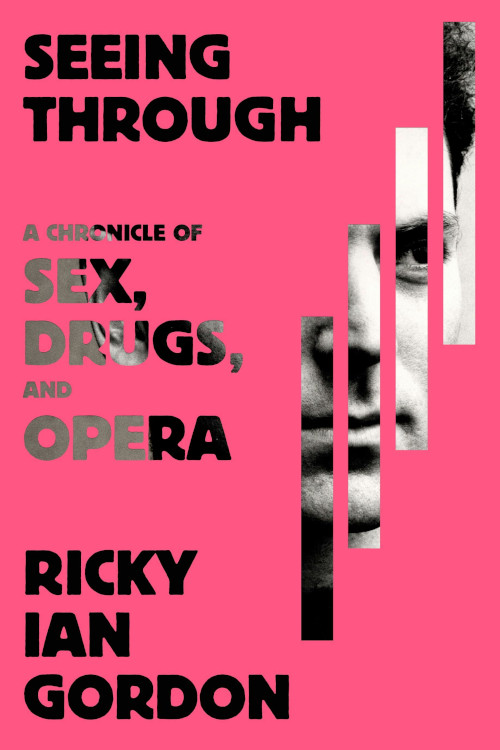One of contemporary opera’s most brilliant and prolific composers, the inestimable Ricky Ian Gordon, has not only laid bare his soul, but also richly chronicled the peaks and valleys of the routes to his creative output in Seeing Through: A Chronicle of Sex, Drugs, and Opera.
This confessional, obsessional, processional of the high roads and low roads that brought Mr. Gordon inexorably to his current estate of mind, hopscotches place, time, and musical projects to piece together a compelling mosaic of his soul, an image that is often profound, sometimes profane, frequently fragile, recurrently laser-focused, and all in all, wondrously laid bare for us to dissect. It seems there is not one sentence of this sizable opus that is not infused with fiery passion and keen determination.
The first two words of the title perhaps mean seeing ‘things’ through, or maybe seeing through ‘artifice,’ both of which the author has emphatically done; or maybe even seeing life through ‘a filter,’ of optimism, melancholy, and at times, unbounded joy.

I have spent a very small amount of memorable time with Ricky, who was congenial and warm, with a hail-fellow-well-met assurance that did not in any way prepare me for the despairing depths, phobias, fears, and faux pas that have colored and peppered his childhood, young adulthood, and maturation. Having been clued in by this revelatory book, he seems to me now as a lovely, composed swan, sleekly and serenely floating on a lake of success, all the while his feet are frantically pedaling beneath the surface, urging him forward, or maybe in purposeful escape from some encroaching misfortune.
Any aspiring or maturing artist should find enormous resonance with his conquests and triumphs, to be sure. They might also recognize themselves in the dynamic of “opportunities missed” as well as “actions regretted.” But please don’t think this is a heavy-handed, rueful slog through bathos, no! The astonishingly frequent rays of light, laugh out loud quips, and humorous admissions of self-confessed personality quirks are always lurking in the narrative to spring up in sassy surprise.
For gay men, in particular, there will be enormous empathy with the saga of Ricky’s unbearably brief and intense relationship with the love of his life, Jeffrey, who succumbed to AIDS. This poignant tale spans several chapters, becoming the beating heart of Seeing Through, which stirs vivid and important memories of a painfully tragic time. The author has a nice way of bookending the writing with characters near (if not always dear) to him, but as the episodic, non-chronological sequencing seesaws back and forth, the point of balance in the center of the piece is always: Jeffrey.
As for the part of the title that is A Chronicle of Sex, Drugs, and Opera, I can say there is truth in that advertising. There is a whole lot of all three, and the candor with which those experiences are related is by turns titillating, startling, casual, puzzling, complex, compassionate, and voyeuristic. These prolific and explicit exploits are not so much like an accident from which you can’t look away, but more like an accident in which you might not mind getting buzzed and rear-ended.
All this Puck-ish debauchery and emotional maneuvering is really the exceedingly detailed background that informs and motivates Ricky’s creative output. It is the potent collective “cause” for the boffo “effect.” All of the major musical works are documented therein, but the book never descends to an “and-then-I- wrote” litany, but more cleverly frames the stage pieces within the challenges they faced, and the assets (or lack thereof) that were associated with each compositional process.
The obstacles that thwarted resourcing and properly producing the major opera, The Garden of the Finzi Continis were especially maddening and saddening in their scope. Other, happier conditions enhanced such triumphs as Intimate Apparel, The Grapes of Wrath, and 27, to name a few. In these pages, my heart rejoiced not only for the tremendous quality and success of the stage works, but also that with the rapturous reception of these pieces, Ricky seems to momentarily leave behind a catalogue of self-doubt and allows himself to revel in his great gifts.
I had the pleasure to review the revival of Grapes, and the World Premiere of 27 in the wonderful stagings at Opera Theatre of Saint Louis. I loved them and said so. It was humbling indeed, then, for Ricky to have written in this book, that his favorite review of 27 was mine, with its headline: “A Hit Is a Hit Is a Hit.”
When I produced the West Coast Premiere of 27 in my capacity as General Director of Opera Las Vegas, the company brought Ricky and librettist Royce Vavrek to town for it. It was “an event.” The mayor proclaimed 27 April as “Twenty-seven Day” in the city. The two of them spoke to music students at the University, culminating with Ricky accompanying himself on the piano, singing his sublime song, “A Horse With Wings” for the enrapt listeners. Opening night, as the great final quintet (“Two Women”) engulfed the small theatre with a luminous effect, with Rick and Royce beaming in the front row, I had tears of joy rushing down my cheeks, an indelible memory.
I know that this author and composer will keep on making many many more memorable moments as his journey continues. Ricky Ian Gordon is a Mensch. His Seeing Through: A Chronicle of Sex, Drugs, and Opera has many new chapters left to be written. But as of now, it is already a highly satisfying, complicated, intriguing, vexing, informative voyage, that caroms around the world of classical music and theatre VIP relationships, bumping heads, bruising egos, and bonding in creative fruition.
When I was a kid, there was a carnival ride that was popular at county fairs: The Wild Mouse. The two-person roller coaster cab was set far forward on the wheels so on the many sharp turns you seemed to teeter over the edge of the tracks. You would sort of casually coast along, and then suddenly get whipped around breathlessly in a new direction, only to have the bottom drop out at a sudden unexpected dip, then steadily climb back to the top, just to come careening back down again, trying to keep your wits in your head and your heart in your chest.
And that is how I felt about Seeing Through: It is a wild ride. Settle in and buckle up!
James Sohre

Farrar, Straus and Giroux
ISBN 9780374605728
480 pages
Top image: A scene from The Garden of the Finzi-Continis. Photo by Steven Pisano courtesy of Ricky Ian Gordon.